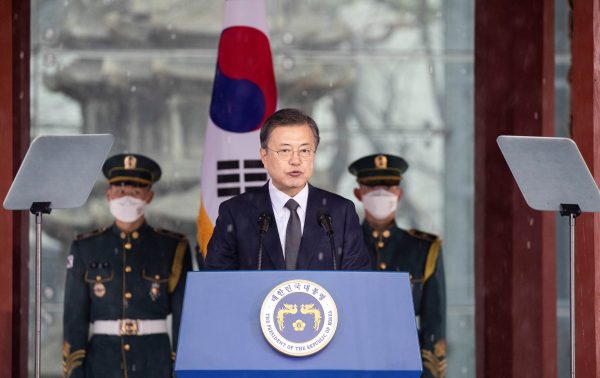His administration has achieved several foreign policy successes. It de-escalated tension with North Korea. It handled an increasingly difficult relationship with the United States during a period of significant turbulence and upheaval. And it presided over a period of substantial growth in South Korean soft power, aided by global attention to the inter-Korean summits, K-pop fandom and an invitation to the G7.
As Moon considers his legacy in his final year, failure to promote reconciliation with North Korea likely looms large. With increasingly ominous signs from Pyongyang and a North Korea policy review still underway in Washington, it is easy to predict that the Korean Peninsula will again descend into crisis diplomacy.
Crisis diplomacy is a repetitive cycle on the Peninsula. North Korea escalates, South Korea manages and de-escalates. North Korea secures limited gains and South Korea secures limited respite. Crisis diplomacy never transforms the root causes of tension. This is where summitry with North Korea failed — and was always going to fail.
The Moon administration should now look past summits and consider alternatives. An international commission on the Korean Peninsula should sit atop the list.
An international commission is an ad-hoc transnational investigative mechanism, which can be constituted as either a temporary intergovernmental organisation (IGO) or a non-governmental organisation (NGO). International commissions have specific advantages.
First, international commissions create space outside the day-to-day pressures of international affairs to encourage new ideas. They investigate and collect alternative options from a wide range of sources, such as experts in multilateral processes, policymaking, and socio-economic, political, military and strategic affairs. The largest problem for addressing Korean Peninsula security issues is the absolute lack of new ideas. The debate is constrained by partisanship, path dependency, a sclerotic economy and a neurotic political system. There are no new ideas to resolve Peninsular issues, only tinkering at the edges.
Second, international commissions can transform thinking about how a global problem may be addressed. The end result of an international commission is a comprehensive and authoritative report. The report acts as a guide for efforts to find policy solutions. Previous commissions of this sort transformed understandings of development, the environment and sovereignty.
The Korean Peninsula is a global challenge. It was seen as such when the United Nations committed forces to repel the invasion by North Korea in 1950, and when the Geneva Conference was held in 1954 to find a long-term solution. The Cold War and purposeful neglect shrunk its importance. Peninsular issues today are often considered under the purview of just six countries: members of the Six-Party Talks. All too often, it’s even considered a bilateral issue concerning only North Korea and the United States. An international commission would return the Korean Peninsula question to the global agenda.
Third, an international commission is a characteristic middle-power initiative. It allows middle-power states more freedom. It gives them space to secure ideas and best practices, and to garner assistance and support. Most importantly, international commissions allow middle powers to build coalitions, thereby increasing their capacity to influence and persuade major powers.
One likely obstacle is North Korean participation. Policies based on the premise of North Korean action are inherently risky. Participation would be North Korea’s prerogative. It could either secure a global audience to highlight its own concerns and aims, or it could see itself more alienated and excluded from policy discourse and global consensus building. Yet, an international commission could still proceed to investigate new ideas and solutions to the global problem of Korean Peninsula security even without North Korean participation.
There are also domestic benefits. The authority of an international commission reduces the tendency to see policy options through domestic political lenses, thereby increasing consensus — something sorely lacking in current South Korean politics.
Finally, establishing an international commission on the Korean Peninsula would create a long-lasting legacy for the Moon administration. A commission’s influence might last up to 10 years or longer if intermittent reviews are undertaken. For an administration that has set itself to be judged against its objective to promote reconciliation with North Korea, there could be no more appropriate legacy.
While an international commission should have been launched while the diplomatic fruit was ripe, it’s still not too late. But time for the Moon administration to make a long-term contribution to resolving the question of Korean Peninsula security is rapidly running out.
Jeffrey Robertson is Associate Professor of Diplomatic Studies at Yonsei University.

